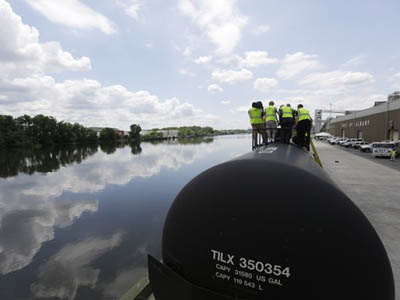
Firefighters and other first responders are familiarized with tank cars on the CSX Safety Train next to the Hudson River in the Port of Albany. Albany has become a major hub for shipping crude oil, which arrives daily in hundreds of tank cars to be shipped down the Hudson to New Jersey refineries.
(Photo: AP Photo/Mike Groll)
WASHINGTON – New York officials are reviewing a request by CSX to not publicly disclose movements of its freight trains carrying crude oil across the state.
The state began receiving weekly information about the shipments earlier this month under an emergency order signed in May by U.S. Transportation Secretary Anthony Foxx.
The routing information is being shared with “appropriate state public safety officials,” according to the New York State Division of Homeland Security and Emergency Services.
And state officials “will coordinate all relevant rail shipment information with the local first responders in the counties where the shipments pass through,” agency spokesman Peter Cutler said in an email.
Cutler did not indicate when that coordination with local first responders might begin.
There have been 16 significant freight rail accidents in the U.S. and Canada since 2006, including one last July that killed 47 people.
Crude oil and ethanol fires caused by derailed freight trains are left to burn out on their own because first responders can’t extinguish them, fire safety officials told the National Transportation Safety Board at an April forum. Many suburban and rural community fire departments don’t have enough training or manpower to handle railroad tanker fires, the International Association of Fire Chiefs said at the NTSB forum.
Democratic Sen. Chuck Schumer of New York, who lobbied for getting the information to local first responders, declined comment Thursday on whether the timing and routes of the crude oil train shipments should be made public.
“The bottom line is that local first responders need real-time data from rail companies to protect property and save lives,” Schumer said in a statement. “I believe this can be done in a common-sense way without compromising safety and security.”
Schumer announced Thursday he is a co-sponsoring legislation authored by Democratic Sen. Heidi Heitkamp of North Dakota requiring the Federal Emergency Management Agency to form a panel to address freight derailments involving hazardous materials and crude oil tankers.
The proposed FEMA committee would bring together emergency responders, federal agencies and others to address training issues and best practices for responding to derailments.
Freight trains carrying 100 or more tanker cars of crude oil regularly run through Buffalo, Rochester, Syracuse and Utica to terminals in the Albany area. The oil arriving in Albany is either moving through the Port of Albany for shipment by barge and tanker, or on the CSX river line on the western shore of the Hudson River south to New Jersey.
The New York State Division of Homeland Security and Emergency Services declined comment on whether the Canadian Pacific has disclosed if it is shipping crude oil on its eastern New York line that begins at Rouses Point and continues south through Plattsburgh along Lake Champlain to Saratoga and Albany.
An estimated 434,000 tanker loads of crude oil were shipped by rail in the United States last year, compared to only 9,500 in 2008, according to the Association of American Railroads.
Much of that oil was carried from the Bakken Formation oil field in North Dakota and Montana to refineries on the East, West and Gulf coasts.
Oil production in the Bakken field reached 1 million barrels a day in December and is forecast to peak at 2 million barrels a day in seven years, according to CSX.
Brian Tumulty / poughkeepsiejournal.com
| ![]()




